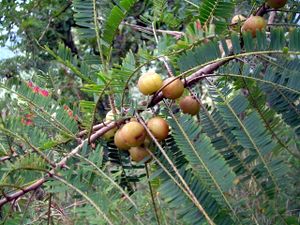Note: This is a project under development. The articles on this wiki are just being initiated and broadly incomplete. You can Help creating new pages.
Difference between revisions of "Phyllanthus emblica - Triphala"
| Line 1: | Line 1: | ||
[[File:Phyllanthus officinalis.jpg|thumb|right| ''Phyllanthus officinalis'', ''Triphala'']] | [[File:Phyllanthus officinalis.jpg|thumb|right| ''Phyllanthus officinalis'', ''Triphala'']] | ||
| − | |||
| − | |||
''Triphala'' is an Ayurvedic herbal rasayana formula consisting of equal parts of three myrobalans, taken without seed: Amalaki (Emblica officinalis), Bibhitaki (Terminalia bellirica), and Haritaki (Terminalia chebula). | ''Triphala'' is an Ayurvedic herbal rasayana formula consisting of equal parts of three myrobalans, taken without seed: Amalaki (Emblica officinalis), Bibhitaki (Terminalia bellirica), and Haritaki (Terminalia chebula). | ||
Medicinal use | Medicinal use | ||
Revision as of 12:55, 29 November 2016
Triphala is an Ayurvedic herbal rasayana formula consisting of equal parts of three myrobalans, taken without seed: Amalaki (Emblica officinalis), Bibhitaki (Terminalia bellirica), and Haritaki (Terminalia chebula). Medicinal use
In traditional Ayurvedic medicine, Triphala is used for:
- immune system stimulation
- improvement of digestion
- relief of constipation
- gastrointestinal tract cleansing
- relief of gas (carminative)
- treatment of diabetes
- treatment of eye diseas.
These health claims have not been yet tested in clinical trials on humans. Even within the practice of Ayurvedic medicine, there are controversies about the composition (amlaki, haritaki and bibhitaki), preparation, and medicinal uses of Triphala.
